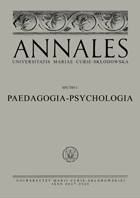Czy pop psychologia uczy psychologii? Wiedza psychologiczna wśród uczniów szkół ponadpodstawowych
Does Pop Psychology Teach Psychology? Psychological Knowledge among Students of Secondary Schools
Author(s): Marlena ModzelewskaSubject(s): School education, History of Psychology, Sociology of Education
Published by: Wydawnictwo Naukowe Uniwersytetu Marii Curie-Sklodowskiej
Keywords: secondary school students; pop psychology; psychological knowledge; psychological education;
Summary/Abstract: Pop psychology is a phenomenon that evokes extreme emotions. Myths that work to the detriment of the recipients get into the general consciousness. Of course, there are also valuable items that have the hallmarks of pop psychology. Therefore, the ability to think critically and search for reliable knowledge is important. Can students do this? They receive relatively little psychological education in schools, so if they want to learn something in this matter, they must use the knowledge available outside traditional education. In order to determine the psychological knowledge of adolescents, a CAWI quantitative study was conducted using the Qualtrics tool on a sample of 204 secondary school students. The main research problem is: What is the state of knowledge of secondary school students? Research questions: How much psychological knowledge do secondary school students have? From which source(s) do students mainly obtain psychological knowledge? Do secondary school students agree with the statement that psychological knowledge is useful in their lives? The study shows that students’ knowledge is at a relatively good level (the average value of the indicator on a scale of 1–3 was 1.94). The most frequently chosen terms to define are phobia, anorexia, depression, narcissism, and empathy. In turn, the concepts with the highest declared level of knowledge are depression, manipulation, phobia, positive thinking, and sexual orientation. The vast majority of students (91%) see the usefulness of psychological knowledge in their lives. They obtain it mainly from the Internet (71% from websites, 69% from social media), and much less often from school (29%). The school has the opportunity to equip students with reliable psychological knowledge during one of the most important (from the point of view of human development) periods of life. Therefore, it is worth taking systemic actions that will enable students to navigate the world efficiently and understand themselves as best as possible.
Journal: Annales Universitatis Mariae Curie-Skłodowska. Sectio J. Paedagogia-Psychologia
- Issue Year: 36/2023
- Issue No: 1
- Page Range: 149-178
- Page Count: 30
- Language: Polish

